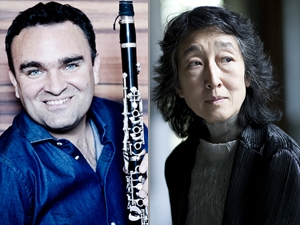Beautiful playing by Widmann, Uchida makes for a memorable recital at Zankel Hall

Jörg Widmann and pianist Mitsuko Uchida performed Sunday at Zankel Hall.
Outside of the conservatory, clarinet recitals are uncommon events. So there was a curiosity factor involved in the duo of clarinetist-composer Jörg Widmann and pianist Mitsuko Uchida playing Sunday afternoon at Zankel Hall. The relative exoticism of the event, though, was quickly forgotten by the wonderful musicianship and the superb choices of repertoire.
The concert mixed duets with solo pieces, with two of the solo works by Widmann. The most familiar music was Brahms’ Clarinet Sonata, Op. 120, No. 1, which began the concert, and Schubert’s Impromptu in C minor, D. 899, No. 1, played by Uchida after intermission. And there were two relatively obscure pieces; Four Pieces for Clarinet and Piano, Op. 5, by Alban Berg, and Schumann’s clarinet Fantasiestücke, Op. 73.
Uchida’s sensitivity and clarity are well-known, as is her Schubert playing. Widmann is a great clarinetist, one of the best of our day. He has a classic, pure sound, bright and focused, with impeccable articulation.
They played as equal interpretive partners, even as the compositions by Brahms, Berg, and Schumann set the clarinet as the lead voice. This showed in details like the perfectly matched terracing of dynamics in the Brahms sonata, and the slight pauses in each piece that opened up spaces for breath and reflection, and created suspense for the music to come. Their playing was extraordinary beautiful throughout in a way that was so directly powerful that it made analysis superfluous; the beauty spoke for itself as a product of the musicians’ discernment, commitment, and skill.
They found the stately melancholy of late Brahms in the sonata. The Andante in poco adagio had an ache, even as Widmann wrestled with some reed problems, and the brighter music of the final two movements, a rueful vivacity. Their dynamics were powerfully expressive, with exquisite diminuendos.
Widmann had a weight of expression with a lightness of manner while playing Brahms, Berg, and Schumann that was captivating, exciting the mind and touching the heart. The Berg and Schumann pieces share qualities of each composer’s vocal music; Berg’s Op. 5 seemed a twin in color and expressive quality to his Sieben frühe Lieder, and the Fantasiestücke echoed the likes of Dichterliebe. Widmann’s clarinet sang like a great vocalist.
The Four Pieces, Op. 5, are mostly atonal, though not systematized in the twelve-tone manner. But that is far secondary to how expressionistic the music is. Berg was the greatest of all the expressionist composers, and Widmann seemed to caress and articulate each note, producing alluring meaning by balancing the complex wandering of the clarinet lines. Uchida’s playing was agile and gentle. They had the long view in sight. The mournful reticence, sudden bursts of energy, the fragments groping towards articulate speech cohered through the musicians’ thinking into coherent, affecting form.
The lyricism of Schumann’s piece was honored by giving full, simple voice to the melodies. The first of the three movements is the most lyrical and Widmann’s clarinet was just ravishing, with a gorgeous line. The playing brightened along with the music, but never lost its deepness.
Uchida gave the Impromptu the sense of poetry and order she consistently brings to Schubert. Her interpretive touches—a slight marcato in the opening theme, the understated lyricism with which she played that theme at each new iteration—were ideal. Her forward motion had a feeling of relaxed velocity, and she defined each variation as a part of a structure that was both horizontal and vertical. It felt as if she was channeling Schubert directly.
Widmann’s Sonatina facile, written for her, was a chance for her to show off the agility in her hands. Anything but easy, there’s a built-in joke in that the piece uses Mozart’s K. 545 “Sonata facile” as a foundation, then explodes with Widmann’s take on the piano repertoire that followed, from Beethoven to Boulez.
A product of Carnegie Hall’s 125 Commissions Project, the rapid-fire, quasi-references are dazzling. The structure begins as intellectually teasing and satisfying and then steps off the cliff of virtuosic pianism into mysterious, cold waters of contemplation. Uchida stirred up those depths, without ever muddying the waters. This clever, skillful piece ended on a good-natured note.
Widmann’s Fantasie for Solo Clarinet showed off his technical skill on the instrument, and was as full of vitality as the piano piece. Opening up with sustained, strong multiphonics, he swept through some long, fluid glissandos, before flying around with rapid-fire, precise, tenuto flurries. With his brilliant playing, the piece sounded like a finely structured improvisation, each idea leading with logic and surprise to the next.